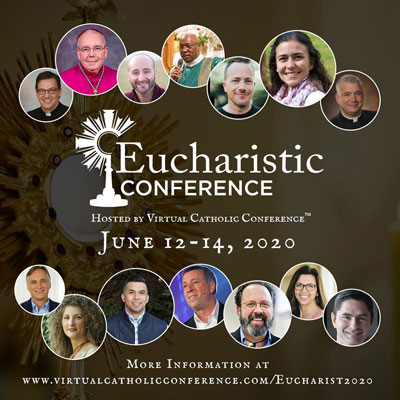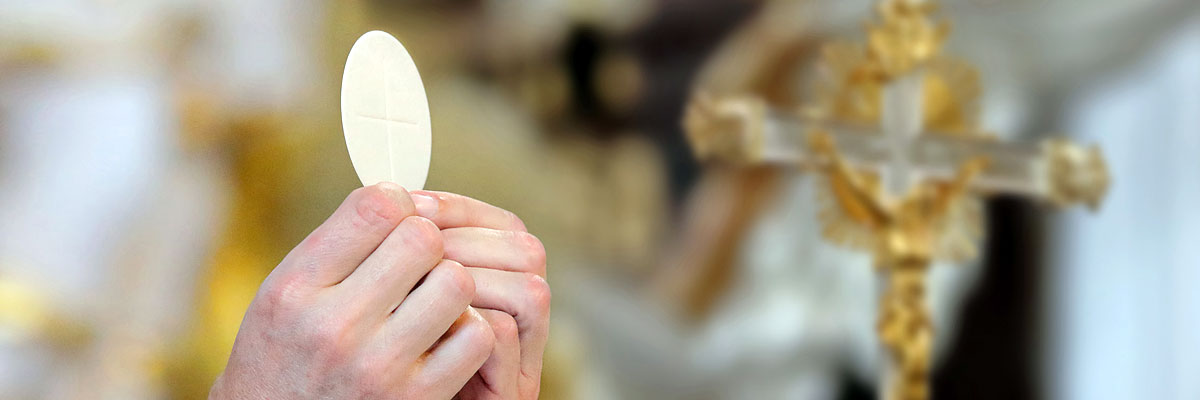Official Website of the
Catholic Diocese of Little Rock
Eucharist: Jesus' body, blood, soul, divinity
Published: June 12, 2020
“I am the living bread that came down from heaven; whoever eats this bread will live forever; and the bread that I will give is my flesh for the life of the world.” — John 6:51
Historically known by its Latin name, Corpus Christi, this feast day highlights the Real Presence of Jesus in the Eucharist, — Body, Blood, Soul and Divinity. The word "Eucharist" means "thanksgiving." It comes from the Greek "eucharistein" and "eulogein," which "recalls the Jewish blessings that proclaim — especially during a meal — God's works: creation, redemption and sanctification." (Catechism of the Catholic Church, no. 1328)
 On the night before he died, Jesus shared one last meal with his Apostles. During this Last Supper, "he took the bread, said the blessing, broke it, and gave it to them, saying, 'This is my body, which will be given for you; do this in memory of me.' And likewise the cup after they had eaten, saying, 'This cup is the new covenant in my blood, which will be shed for you.'" (Luke 22:19-20)
On the night before he died, Jesus shared one last meal with his Apostles. During this Last Supper, "he took the bread, said the blessing, broke it, and gave it to them, saying, 'This is my body, which will be given for you; do this in memory of me.' And likewise the cup after they had eaten, saying, 'This cup is the new covenant in my blood, which will be shed for you.'" (Luke 22:19-20)
Through the Apostles' successors, the Catholic Church has been following Jesus' command to "do this in memory of me" for more than 2,000 years. "In order to leave them a pledge of (his) love, in order never to depart from his own and to make them sharers in his Passover, (Jesus) instituted the Eucharist as the memorial of his death and resurrection, and commanded his Apostles to celebrate it until his return; 'thereby he constituted them priests of the New Testament.'" (Catechism of the Catholic Church, no. 1337)
Taking him at his word when he said, "This is my body," and "This is my blood," the Church teaches that the bread and wine become the Body and Blood of Jesus at every Mass. Though Christ is present in many ways in his Church, his presence in the Eucharist is unique. He "makes himself wholly and entirely present" under the appearance of bread and wine. Therefore, the Eucharist is the "source and summit of the Christian life." (no. 1324)
"The Church and the world have a great need for Eucharistic worship. Jesus awaits us in this sacrament of love. Let us not refuse the time to go to meet him in adoration, in contemplation full of faith, and open to making amends for the serious offenses and crimes of the world. Let our adoration never cease." — St. John Paul II, "Dominicae Cenae," no. 3
Because of its importance, the Church has a special feast day to recognize the presence of Jesus in the Eucharist. The Solemnity of the Most Holy Body and Blood of Christ, traditionally called "Corpus Christi," (Latin for "Body of Christ,") traces its origins back to Pope Urban IV who declared the universal celebration of this feast day in 1264.
He asked papal theologian St. Thomas Aquinas to compose new liturgical texts for the feast. His "'Adoro te Devote,' remains an essential part of the Church’s sacred hymnography. The 'Pange Lingua,' for example, is often sung during the Eucharistic procession after the evening Mass of the Lord’s Supper on Holy Thursday, to which the last two stanzas are referred separately as 'Tantum Ergo' and sung at benediction of the Blessed Sacrament." To learn more, read Simply Catholic.
Traditionally, Catholics celebrate this great feast with a Eucharistic procession, holy hour, Eucharistic adoration with benediction of the Blessed Sacrament or a Litany of the Most Precious Blood. However, this year those activities may not be possible during the COVID-19 pandemic. Please contact your parish to find out what options are available. For those unable to participate in person, Virtual Catholic Conference is sponsoring a free Eucharistic Congress, entirely online, from June 12-14. After that, on-demand access is available for a one-time fee. To learn more, visit the conference's Facebook page.




